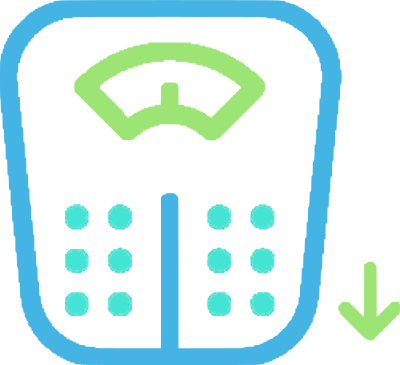


myBMI is a bespoke weight management service built by medical specialists to give you access to the best weight loss treatments in the world. Our team are UK medically trained in innovative and specific weight management treatments such as GLP-1 Receptor Agonists, our first line treatment for weight control.
Our consultation process is entirely online and designed to enable our team of medical experts to determine the most effective treatment plan for you.
We here at myBMI also understand that weight loss is a journey which requires multiple pillars of support and as such will also provide you access to our community which provides access to daily meal ideas, exercise plans, and specialist support with weekly video content from our medical experts.
Our treatment plan is simple, all-inclusive of the costs of prescribing, dispensing, treatment options and delivery to your door. We will also prescribe, free of charge, any additional treatments that you may require along your journey, again completely inclusive of the fixed price. Our team are here to support you every step of the way.


Complete our free online consultation which has been expertly designed by our healthcare team to assess your overall health and weight loss goals.
Our clinical team will recommend your customised treatment based upon the options available.

One of our highly experienced weight management specialists will review your health record and consultation.
In conjunction with your preferences they will determine the most appropriate treatment for your and will submit a prescription to our partner pharmacy for dispensing.

Our partner pharmacy will discreetly & securely send your treatment & welcome pack directly to you via a fast, tracked & signed for delivery service.
You will also be invited to join our exclusive support group, providing access to medical support and exclusive content including Q&A's with our pharmaceutical lead, James O'Loan.

When you are in your last weeks supply of your monthly treatment plan, log into your dashboard and complete the returning patient consultation.
Our specialists will review your progress and work with you to titrate or maintain your dosages in order to support you in achieving your weight loss objectives and keep your BMI in a safe zone.
Our weight management service is underpinned by our four core values. These four values shape everything we do ensuring our patients have access to the most innovative medical treatments supplemented with diet, exercise, support and education to allow our patients the optimal change to achieve their target BMI.
We believe the key to successful and maintained weight loss is education and also support on your journey.
Our team keep our extensive hub of support, advice and educational content up to date and each topic is vetted by our clinical team.
It is important to us that our patients are educated at every step of the way.
We know that some people cannot achieve their weight loss objectives utilising a diet and exercise programme alone. Therefore we provide a highly effective prescription strength treatment to support your weight loss journey.
Our clinical team are specially qualified in using market leading medical therapies. We prescribe treatments and support you with all the information your need to move through each stage of the myBMI journey.
We believe that diet is at the forefront of helping our patients achieve their weight loss goals how ongoing diet planning is essential to your weight management. We understand how difficult diet control is in a modern busy world.
We are proud to support all our patients with their diet. Ensuring our patients are given inspiration in their diet is key to helping them on their weight loss journey.
Regular and appropriate consistent exercise is just as critical as diet choices in helping our patients achieve their target weight.
Staying active and fit is essential to maintaining a healthy lifestyle. Our specialists will provide bespoke physical activity programs to match your objectives, capabilities and also seek to make your exercise programme enjoyable.
Here are some answers to the questions we receive the most about our services.
If we missed anything, please do not hesitate to contact us. We’ll be happy to help.
At myBMI, our first-line treatment for obesity is either a weekly injection, daily injections, or daily tablets.
Whilst many other places choose to use other medications as a first-line treatment, our team of weight management specialists have drawn on their years of expertise and have decided to offer GLP-1 Receptor Agonists to those that meet the criteria. These options include Wegovy and Saxenda.
Although GLP-1 Receptor Agonists are our preferred first-line treatment, they may not be the right medication for you.
If this is the case, then our prescribers won’t be able to recommend this type of medication and will not write you a prescription for one.
This is why we’re planning on expanding our range of available treatments in future, so we can offer more options to our patients.
Most people starting our treatment plans will need to increase their dose after the first month.
If you’re starting for the first time, or you’re restarting after a few weeks off, you will usually start on either a 0.25mg weekly injection or a 3mg daily tablet.
At the end of this 28 day period, you should come back for another consultation to increase your dose, as these treatments require titration.
After your first month of treatment, you may be increased to either a 0.5mg weekly injection or a 7mg daily tablet.
After this, your prescriber will monitor your progress and decide with you whether to increase your dosage again.
The prescriber will always make the final decision on your dosage and treatment, but you will be able to indicate your preference to them during your consultation.
Our weekly injection plan is exactly what it says on the tin – a weekly injection!
No matter what your dose is, you’ll only be injecting once a week, as the dosage change will be reflected in your injector pen.
If you forget a dose, you should take it as soon as you remember as long as it is within five days of when you were supposed to take your injection.
You should then take your next dose as planned.
If more than five days have passed since you forgot your dose, skip it, and just wait for the next dosage day to come around.
Our package is fixed at £279, which includes your consultation, any weight loss treatments you may need, as well as supporting treatments if you experience side effects such as nausea or diarrhoea.
You will pay £279 for each consultation you have, so once your treatment runs out after 28 days, you should come back to us for a review.
We have these reviews so we can monitor your progress, assess any concerns you may have, and help you make informed decisions about your treatment plan.
This set cost will only increase if you have been taking weekly injections for some time and begin one of our higher dose plans, where an additional surcharge is added.
With that in mind, we must mention that all of our prices are subject to change at any time. This usually happens to account for increased demand for treatment and supplier shortages.
Yes, you can!
During your consultation, you should be given an option to stay on your current treatment, or change to another form of treatment.
You can choose to switch from weekly injections to daily tablets or vice versa, as our weight management specialists are able to prescribe you an equivalent dosage to what you’re already taking.
Please note that any final decisions on treatment are made by the prescriber.
If you’re taking Wegovy:
If you forgot to use your injection on your usual day, you can just inject yourself as soon as you remember, as long as it’s within 5 days from your usual injection day.
For example, if you usually inject on a Monday but have forgotten, you can still take your “missed” dose up to Friday.
If more than 5 days have passed since you were supposed to take your injection, you should skip the injection and continue treatment as normal when your next dose is due.
Don’t inject yourself twice to make up for a missed dose.
If you’re taking the daily tablet:
If you forget to take your tablet one day, just skip that day’s dose and carry on as normal the next day.
Don’t take more than you’ve been prescribed each day to make up for a missed dose – just skip that day and continue as you normally would the day after.
Currently, we offer our first line treatment in three forms – a weekly injection, a daily injection and a daily tablet.
During your first consultation, you will be asked to choose which treatment you’d like.
Some people prefer to take a daily tablet instead of an injection, which is why we offer several options.
Whilst the final decision lies with the specialist prescriber, your preferences will be taken into account when the decision is made.
Most people that take our weekly injections, daily injections or daily tablets for weight management find that they help to reduce their appetite and BMI.
Current studies that look at GLP-1 Receptor Agonists like Semaglutide and Liraglutide as a treatment for obesity show them to be an effective and safe option for reducing weight in those with a BMI of over 30.
However, as with all medications, there’s no guarantee that it will work for you.
With that in mind, we do recommend trying your treatment for at least 12 weeks before deciding whether or not it’s right for you.
During this time you should speak with your prescriber regularly so they can help you to make any changes you may need to to get the best out of your treatment in a safe and effective way.
As with most prescription medicines, Wegovy GLP-1 Receptor Agonist inections do have the potential to cause side effects in some people.
However, these usually go away on their own within a few weeks once your body as become used to the medication.
Most of the side effects reported with the weekly injections are related to the gastrointestinal system, so you may experience nausea, vomiting, diarrhoea or constipation.
If you are one of our patients and are experiencing side effects of the weekly injections, our healthcare team can provide supplementary treatments to help you as your body gets used to your treatment.
These treatments can include anti-sickness medications, heartburn remedies, and more, depending on the side effects you’re experiencing and what would be right for you.
Weekly injections of GLP-1 Receptor Agonists are now available on the NHS for type 2 diabetes and weight management – where they’re known as Wegovy.
Wegovy is available to patients who have reached tier 3 of the NHS’s weight management services.
Unfortunately, reaching tier 3 of the weight management service can be time-consuming and will not always result in a prescription for GLP-1 injections.
This is why many suitable patients choose to have consultations with reputable private prescribers like ourselves, so they can begin their weight loss journey as quickly as possible.
No, but they are similar.
Our first-line treatments are GLP-1 Receptor Agonists, which means that their active ingredient is from the same group of medicines as Liraglutide, the active ingredient in Saxenda.
This means that these treatments work in a similar way, whether you take them as tablets or injections.
However, there are a few differences between our weight loss treatments and Saxenda.
Saxenda is a daily injection, whereas our treatments can be administered either as a weekly injection or in tablet form.
Current studies also show that the GLP-1 Receptor Agonist our prescribers prefer (Wegovy) tends to be three times more effective for weight management and reduction than Saxenda.
Please be aware that although Wegovy injections are convenient, they may not be right for you.
Our prescribers will need to undergo an online consultation with you so they can understand your condition and prescribe the treatment they think will be the best for you.
Yes, you can switch from daily injections to weekly injections! You could also choose to switch to daily tablets.
If you want to swap from daily weight loss injections (Saxenda) to weekly weight loss injections (Wegovy) or daily tablets, please complete a consultation with one of our experts.
They will be able to determine if this change in medication is a suitable weight loss plan for you or not.
If approved, you should be able to take your weekly injection the day after you stop taking daily injections.



71-75 Shelton Street
Covent Garden
London
WC2H 9JQ
01695 302320
All consultation and prescribing, is carried out by GPhC registered medical practitioners. All dispensing and shipping of medicines is completed by a UK licensed, GPhC registered Pharmacy or a Northern Irish PSNI registered pharmacy.
Chemist4U is our partner pharmacy and prescribing service Innox Trading Ltd, 34a-37 Greenhey Place, Lancashire, WN8 9SA